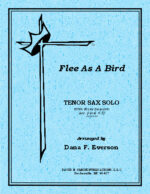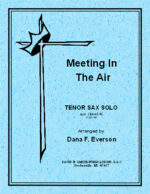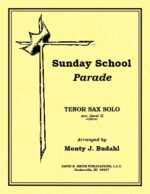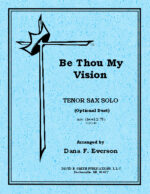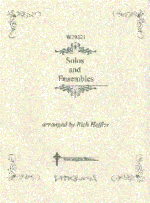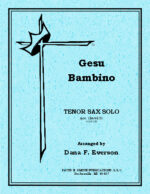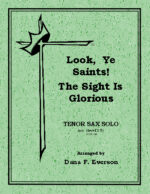-
Flee As A Bird (with flute descant)
$7.50The piece begins with the solo and descant presenting the tune in unison with few modifications. This texture continues on in this manner allowing the descant to act as a color. The next section is an question/answer form with the soloist alternating against the flute and piano. The third section pairs the solo line and descant in much the same manner as the opening. The piece comes to a subtle conclusion. The piece, as a whole depicts a bird flying and flittering about in glee.
-
Meeting In The Air
$5.50A tenor sax solo that is lively and exciting from beginning to the end. A brief introduction sets up the flavor for a modified presentation of the tune. After a modulation the second offering is more sedate and sweet. Only to be answered with a vigorous flair. Another modulation and a more expressive style where it moves upward to an elevated conclusion.
-
Sunday School Parade
$4.50The effect of a parade coming and going… using: Jesus Loves The Little Children; Onward Christian Soldiers; I’ve Got the Joy, Joy, Joy
-
Be Thou My Vision (Opt. Duet)
$4.50This tenor sax solo begins with non-thematic material setting up the mood of the piece. The theme is then introduced in a back-and-forth format between the instrument and accompaniment. It then continues with an altered tune and conventional accompaniment in the background. After modulating upward, the piece becomes more active both rhythmically and theme alterations. The extended final section is flowing where it ends with a strong statement. Optionally, this piece can become a duet with the tenor sax or French horn sets).
-
Jerusalem
$5.95A Rich Heffler Music arrangement of a Hubert Parry song. The introduction is straight forward in the piano and shortly thereafter joined by the soloist. The theme is well decorated- yet in a sensitive manner. The middle section of the piece the roles are reversed with the piano carrying the tune and the solo line providing an uplifting obbligato incorporating much flourish. The piece continues in a similar ever increasing in dynamic and melodic power ending with a strong conclusion.
-
Silent Night
$5.95A Rich Heffler Music arrangement. Basically a straight forward presentation of the melody in the first and third verses which are more staid. The middle section is quite florid. The accompaniment has the flavor of the impressionist construction and harmony.
-
I Will Sing Of My Redeemer
$5.50A Rich Heffler Music arrangement. The piece is in Irregular meters throughout. The work is in a continual jovial manner and is a excellent work for the more mature player.
-
America The Beautiful
$5.95This solo with piano begins with a straight forward introduction in the piano and then sets a solemn mood for the soloist. First plaintive and then with more deviation of the tune. The second section of the piece is stronger and with an almost obbligato treatment of the tune increasing in activity until it concludes on a strong high point.
-
Gesu Bambino
$4.50This sensitive solo arrangement rotates a haunting Sicliano type theme and the traditional Adeste Fidelis in an almost rondo form. A beautiful rendition that is very reflective and meditative and would serve well for any venue.
-
Come, Ye Sinners, Poor and Needy
$5.95Emotive setting of the early American classic. The opening is plaintive in the piano and then joined in with a counter-tune where it then presents the theme in a straight-forward manner. The next section uses the counter-theme again and then presents the theme in an embellished manner. Again the counter-theme is present followed by the embellished theme. After a brief interlude the piece picks up again with the counter-theme where it slowly and quietly settles in repose.
-
Look, Ye Saints! The Sight Is Glorious
$5.50This tenor saxophone piece is sheer delight from beginning to finish. It takes the basic hymn and embellishes the tune in such a way that gives it a whole new flavor. It incorporates scale and arpeggiate movements along with some trills to enhance the exciement. Look! Listen! Play! It is a glorious piece!
-
Away In A Manger
$5.95A Rich Heffler Music arrangement. The piece begins with a statement of “Flow Gently Sweet Afton,” in the piano and is restated by the soloist in a ritornello format. The second statement is made in the piano while soloist soars above it with an obbligato. The piece then switches to “Luther’s Hymn” and then breaks into a variation-like presentation and then begins a free form. The final section imitates the beginning one and then becomes solemn and peaceful.
-
O Sacred Head, Now Wounded
$5.95A Rich Heffler Music arrangement. The piano begins the piece with a flowing and tranquil statement. The solo joins in with a gentle fragment further setting up a poignant picture. It then breaks into the tune in a rather matter-of-fact manner and then adds more embellishment as it progresses. The middle section is extended to give a solemn meditative mood and then breaks into more action for contrast. The piece ends with a quiet, slow and determined repose.
-
A Mighty Fortress Is Our God
$5.95Unusual, emotive and restrained version of the Luther classic The introduction in the piano is presented in an embellished fashion. The solo states the theme in a straight-forward manner. After a brief interlude the solo continues in a different register. Another brief interlude and the soloist continue in a more ornamented manner this time. The piano now states the theme in strong block chords while the solo is very active as an obbligato. Both voices present thematic materials taken from the opening sections. The Coda gives a motivic statement of the opening theme and resolves to a solemn end.
-
He Leadeth Me
$4.50This is a level three solo with piano accompaniment that exudes majesty, tenderness and elegance all at the same time. While it abounds with melodic embellishment the song itself is never lost in the mix. It is simply delightful from beginning to end. It will make a service, concert or contest enhanced because of its presentation.
-
Amazing Grace
$5.95Moving and affective this solo begins unaccompanied and then later joined by the piano in a Celtic style. A second statement of the tune is further embellished and gains more complexity as it progresses. After a brief modulation the solo line becomes more plaintive- even though still embellished. The Coda is based on a brief motif where it ritards into a gentle repose.
-
More Favorite Songs of Praise- tenor sax
$9.9910 solos that can be done as solos, duets or trios with or without piano accompaniment.
-
Classic Praise- Tenor Saxophone
$12.99With CD accompanimentt- includes: Fairest Lord Jesus, Holy Holy Holy, All Glory Laud and Honor, All Hail The Power, When Morning Guilds The Skies and more…
-
Were You There?
$4.00This solo piece opens with a sense of reverence presenting the melody in a gently modified fashion. The middle section gains intensity rhythmically with a rhapsodic form of theme variations. It continues to elevate only to relax into final peace.
-
Concert and Contest Solo Collection Tenor sax (Piano Acc. Book)
$6.95Also available: CD contains split tracks for full performance and paino accompaniment only. Tempo adjustment software included. AND Solo book.
-
Concert and Contest Solo Collection Tenor sax (Solo Book only)
$4.95Also available: CD which contains split tracks for full performance and paino accompaniment only. Tempo adjustment software included.And, Piano accompaniment book.
-
Concert and Contest Solo Collection Tenor sax (CD only)
$9.95CD contains split tracks for full performance and paino accompaniment only. Tempo adjustment software included.

